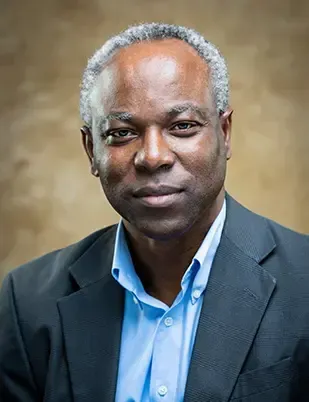
Raymond E. Samuel
Professor
College of Science and Technology
Department of Biology
A chemical engineer, biophysics researcher, physician, orthopedic surgeon, health scientist, Dr. Samuel is known for his interinstitutional and transdisciplinary collaboration on research and education programs.
From 2013 to 2017, he served as Contact Principal Investigator on a large ($3,000,000 per year; $13,500,000 over 5-year project period) NIH-funded Cooperative Agreement, the Hampton University-based Minority Men’s Health Initiative (MMHI). A major component of the MMHI was an innovative Pilot Project Program that catalyzed the entry of new investigators at participating HBCUs to develop strong capabilities in minority men's health disparities research.
Dr. Samuel was the Contact PI for a National Research Mentoring Network (NRMN) Planning Grant and organized a national consortium in the original NRMN competition. He has supported the professional growth and development of early career faculty at HBCUs for nearly 10 years through a myriad of activities, including provision of pilot and seed funding, assistance in building research collaborations, diversity supplement funding, summer research experiences at major research institutions, inclusion in team science activities, and academic career progression.
He also served as the Project Director and Contact PI of the NSF-funded Hampton-Brandeis Partnership for Research and Education in Materials (PREM), wherein an interdisciplinary team at Hampton University and Brandeis University conducted collaborative research aimed at the development of drug delivery systems for delivery of therapeutic agents in cancer and other chronic diseases. He developed and implemented the Hampton PREM’s signature Path-To-Professorship Program, aimed at providing professional development and networking support to advance postdoctoral fellows in their transition to tenure-track faculty positions.
Since he joined NC A&T in 2019, Dr. Samuel has led multiple research and education initiatives covering areas from translational health research to QISE. He has continued to work tirelessly to provide internal and external research experiences for undergraduate and graduate students, promote professional development for junior faculty, and cultivate relationships with academic institutions, national labs, and industry partners on behalf of NC A&T.
He currently serves as the NC A&T Liaison to the UNC Chapel Hill CTSA, wherein they expand the engagement of NC HBCU faculty in translational science and strengthen the regional CTSA partnership. In collaboration with the Student Health Center, he has led two rounds of data collection for the National College Health Assessment at NC A&T. The research team is able to use these data to examine a wide range of topics concerning the health and wellbeing of emerging adult (18 - 25-year-old) populations.
Dr. Samuel has been pivotal in initiating NC A&T’s engagement in QISE. NC A&T is an
inaugural members of the Howard University-based IBM-HBCU Quantum Center, wherein Dr. Samuel recruited undergraduate and graduate students in IBM-HBCU Quantum Center sponsored QIS research projects. He is the Site PI for the NSF-funded QuSTEAM Phase 2 Convergence Accelerator, wherein a consortium of researchers and educators are developing undergraduate curricula for expanding the QISE workforce. Specifically, NC A&T faculty serve on the leadership team, course development teams, and the Discipline-based Education Research (DBER) team. He is PI of the NSF-funded Catalyst Project, which is aimed at increasing the interest in quantum information science and engineering (QISE) among students enrolled at NC A&T via a combination of culturally relevant pedagogy (CRP) and experiential learning activities. His team has recently been awarded an ExpandQISE Track 2 project by NSF, which involves the application of variational quantum algorithms to the design of two-dimensional quantum materials and the computational characterization of complex hypersonic flow conditions. His team will also embark on the construction of a quantum computer on NC A&T campus.
Additionally, Dr. Samuel is currently engaged in three biomedical research projects, wherein they use the layer by layer (LbL) technique to fabricate polyelectrolyte multilayer (PEM) nanoscale functionalized surfaces. They are currently exploring three applications: (1) the use of carbonic anhydrase (CA) for removal of CO2 from industrial fumes, (2) the interaction of induced pluripotential stem cells (iPSCs) on protamine sulfate PEMs, and (3) controlled delivery of plasmid DNA.
One consistent theme of Dr. Samuel’s work is enhancing the diversity of the STEM research workforce along the workforce development pipeline. He is particularly passionate about the preparation of HBCU undergraduate students in biomedical research and QISE. He is the PI and Program Director of the NIH-funded NINDS Scientific Research Preparatory Program, which is intended to prepare a cohort of talented freshmen/sophomore students to successfully compete for admission to the NIH Summer Internship Program (SIP) and other highly competitive Summer Research Experiences for Undergraduates (REU). He has just embarked on a project to teach Point-of-Care Ultrasound to pre-health undergraduate students with the goal of giving these students a head start as they enter professional schools.
Samuel, a native of Saint Vincent and the Grenadines in the Caribbean, earned his Bachelor of Science in chemical engineering from Massachusetts Institute of Technology in Cambridge and his Master of Science and doctorate, both in physiology and biophysics, and his doctor of medicine all from Yeshiva University in New York. He and his wife, Dr. Sheila Tapp, have two sons, Joseph and David.
Recent Publications:
- HekmatiAthar S, Goins H, Samuel RE, Byfield G, Anwar M. Data-Driven Forecasting of Agitation for Persons with Dementia: A Deep Learning-Based Approach. SN Comput Sci. 2021;2(4):326. doi:10.1007/s42979-021-00708-3.
- Adjei-Fremah S, Lara N, Anwar A, …& Samuel RE. The Effects of Race/Ethnicity, Age, and Area Deprivation Index (ADI) on COVID-19 Disease Early Dynamics: Washington, D.C. Case Study [published online ahead of print, 2022 Feb 15]. J Racial Ethn Health Disparities. 2022;1-10. doi:10.1007/s40615-022-01238-1
- Deng D, Zhang L, Dong M, Samuel RE, Ofori-Boadu A, Lamssali M. Radioactive waste: A review. Water Environ Res. 2020;92(10):1818-1825. doi:10.1002/wer.1442.
- Deng D, Lamssali M, Aryal N, Ofori-Boadu A, Jha MK, Samuel RE. Textiles wastewater treatment technology: A review. Water Environ Res. 2020;92(10):1805-1810. doi:10.1002/wer.1437.
EDUCATION
Ph.D.
Physiology & Biophysics / Yeshiva University
Other
Medicine / Yeshiva University
M.S.
Physiology & Biophysics / Yeshiva University
B.S.
Chemical Engineering / Massachusetts Institute of Technology
